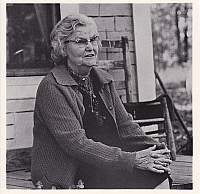 Almeda
Riddle: Granny Riddle's Songs and Ballads
Almeda
Riddle: Granny Riddle's Songs and Ballads Almeda
Riddle: Granny Riddle's Songs and Ballads
Almeda
Riddle: Granny Riddle's Songs and Ballads| 1. Frog Went
a-Courtin' - 3:10 2. Soldier of the Legion - 6:00 3. Tom Sherman's Barroom - 3:15 4. Poor Wayfaring Stranger - 3:25 5. Barbara Allen - 5:30 |
6. Come All Ye Texas
Rangers - 5:25 7. The Orphan Girl - 4:00 8. Children of the Heavenly King - 3:00 9. The Oxford Girl - 6:30 10. The Water is Wide - 3:30 |
Return to Minstrel Records description page. |